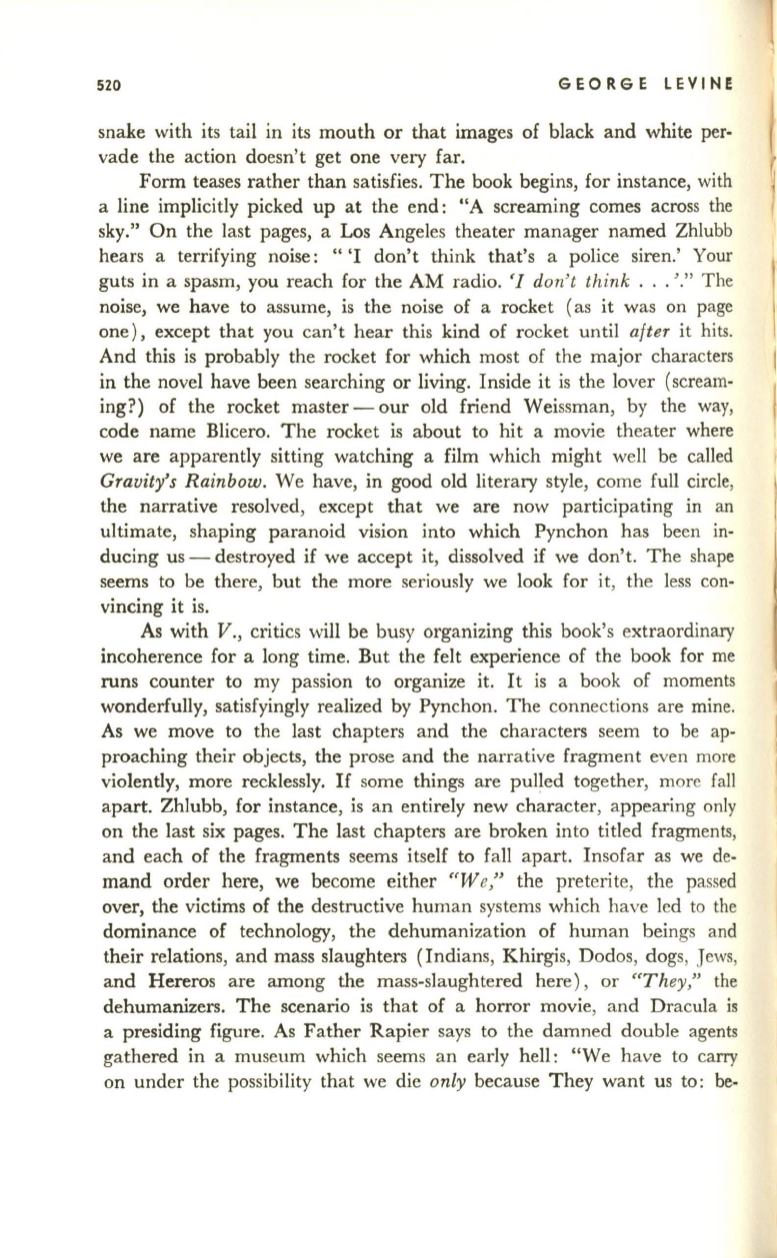
520
GEORGE LEVINE
snake with its tail in its mouth or that images of black and white per–
vade the action doesn't get one very far.
Form teases rather than satisfies. The book begins, for instance, with
a line implicitly picked up at the end: "A screaming comes across the
sky." On the last pages, a Los Angeles theater manager named Zhlubb
hears a terrifying noise: "'I don't think that's a police siren.' Your
guts in a spasm, you reach for the AM radio. '/
don't think .
.. '." The
noise, we have to assume, is the noise of a rocket (as it was on page
one), except that you can't hear this kind of rocket until
after
it hits.
And this is probably the rocket for which most of the major characters
in the novel have been searching or living. Inside it is the lover (scream–
ing?) of the rocket master- our old friend Weissman, by the way,
code name Blicero. The rocket is about to hit a movie theater where
we are apparently sitting watching a film which might well be called
Gravity's Rainbow.
We have, in good old literary style, come full circle,
the narrative resolved, except that we are now participating in an
ultimate, shaping paranoid vision into which Pynchon has been in–
ducing us - destroyed if we accept it, dissolved if we don't. The shape
seems to be there, but the more seriously we look for it, the less con–
vincing it is.
As with
V.,
critics will be busy organizing this book's extraordinary
incoherence for a long time. But the felt experience of the book for me
runs counter to my passion to organize it. It is a book of moments
wonderfully, satisfyingly realized by Pynchon. The connections are mine.
As we move to the last chapters and the characters seem to be ap–
proaching their objects, the prose and the narrative fragment even more
violently, more recklessly.
If
some things are pulled together, more fall
apart. Zhlubb, for instance, is an entirely new character, appearing only
on the last six pages. The last chapters are broken into titled fragments,
and each of the fragments seems itself to fall apart. Insofar as we de–
mand order here, we become either
"We,"
the preterite, the passed
over, the victims of the destructive human systems which have led to the
dominance of technology, the dehumanization of human beings and
their relations, and mass slaughters (Indians, Khirgis, Dodos, dogs, Jews,
and Hereros are among the mass-slaughtered here) , or
"They,"
the
dehumanizers. The scenario is that of a horror movie, and Dracula is
a presiding figure. As Father Rapier says to the damned double agents
gathered in a museum which seems an early hell : "We have to carry
on under the possibility that we die
only
because They want us to: be-


